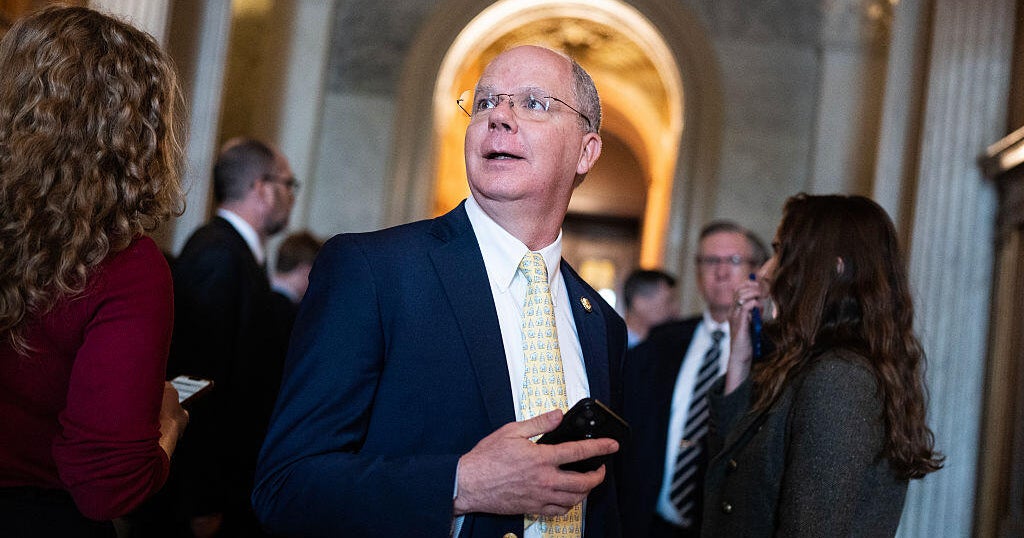Washington — Three key House committees that have jurisdiction over the most contentious parts of a major budget package aimed at addressing President Trump’s defense, energy and tax priorities plan to meet Tuesday to move forward on their portions of the bill, as Republican leaders push to have it on the floor by next week.
The Energy and Commerce, Ways and Means, and Agriculture committees are scheduled to meet Tuesday on their proposals that include changes to Medicaid and food stamps to help pay for tax cuts. But major divisions among Republicans remain on several issues, including how to overhaul Medicaid and a tax deduction expiring in December.
Republicans on the Energy and Commerce Committee, who were responsible for finding at least $880 billion in spending cuts, released the long-awaited details of their plan Sunday. The nonpartisan Congressional Budget Office recently calculated that achieving those savings would not be possible without cuts to Medicaid. Democrats have hammered Republicans on the issue, while Republicans have vowed to protect the benefits of eligible recipients.
The changes to Medicaid laid out in the legislation include imposing work requirements for able-bodied adults without children, more frequent eligibility checks, cutting federal funds to states that use Medicaid infrastructure to provide health care coverage to undocumented immigrants and banning Medicaid from covering gender transition services for children.
The committee did not lower the rate by which the federal government pays states for Medicaid, a point of contention between moderates and conservatives. In recent weeks, Republicans had considered moving more of the cost sharing to the states that expanded Medicaid under the Affordable Care Act. Forty states have adopted the Medicaid expansion, and under that provision, the federal government pays 90% of the costs for expansion enrollees while the states are responsible for 10%. The federal government’s portion for those covered through traditional Medicaid can range from 50% to 83%.
The exclusion is sure to rankle more conservative members who have demanded steep cuts to Medicaid spending, especially for those covered by the expansion. Republican Rep. Chip Roy of Texas, a member of the conservative House Freedom Caucus, expressed his disapproval on Monday, arguing the bill fails to offer any transformative changes to the program that provides health insurance for more than 70 million low-income adults, children and people with disabilities.
“We will need SIGNIFICANT additional changes to garner my support,” Roy said in a lengthy post laying out his issues with the current package.
At least 8.6 million people would lose health insurance and the deficit would shrink by at least $715 billion in the next decade under recommendations in the legislation, according to a preliminary analysis by the nonpartisan Congressional Budget Office released by Democrats on Sunday. Proposals unrelated to health care would reduce the deficit by at least $197 billion over 10 years, the analysis said.
Ways and Means unveiled its plan Monday afternoon that would raise the debt limit by $4 trillion and extend tax cuts enacted during Mr. Trump’s first term — a top priority of congressional Republicans.
The bill includes several of Mr. Trump’s campaign promises, including no tax on tips, overtime and car loan interest. The exemptions would expire at the end of 2028. The legislation also increases the Child Tax Credit from $2,000 to $2,500 for four years.
Tax writers also proposed a $30,000 cap to the state and local tax deduction with an income cap of $400,000. Blue-state Republicans have been pushing for an increase to the $10,000 cap, which is set to expire at the end of the year. But last week, a group of New York Republicans called a $30,000 cap “insulting,” adding that the amount falls short of earning their support.
House leaders have a self-imposed deadline of sending the package to the Senate by Memorial Day, leaving them little time to resolve the outstanding differences.
The Agriculture Committee’s portion increases the age requirement for able-bodied adults without children to qualify for benefits under the Supplemental Nutrition Assistance Program, also known as SNAP., or food stamps The bill updates the age to 64, up from 54. Republicans also want to close a loophole for work requirement waivers that states could request for areas with unemployment rates over 10% or lack “a sufficient number of jobs.”
Mr. Trump put pressure on Republicans to unify behind what he calls the “big, beautiful bill” while on his way to the Middle East on Monday, writing that “we have no alternative.” Other portions of the package include funding for infrastructure and technology enhancements along the U.S.-Mexico border in addition to investments in Customs and Border Protection staffing. It also includes oil and gas leasing mandates to generate billions in revenue.
House Speaker Mike Johnson, a Louisiana Republican, can afford just three defections in a floor vote.



